Led by faculty members Israel Balderas and Jill Auditori, 11 Elon University students received a firsthand look at this year’s presidential primaries in South Carolina and New Hampshire as part of their interdisciplinary Study USA course, The Presidential Campaign Starts Here: The First Primaries.
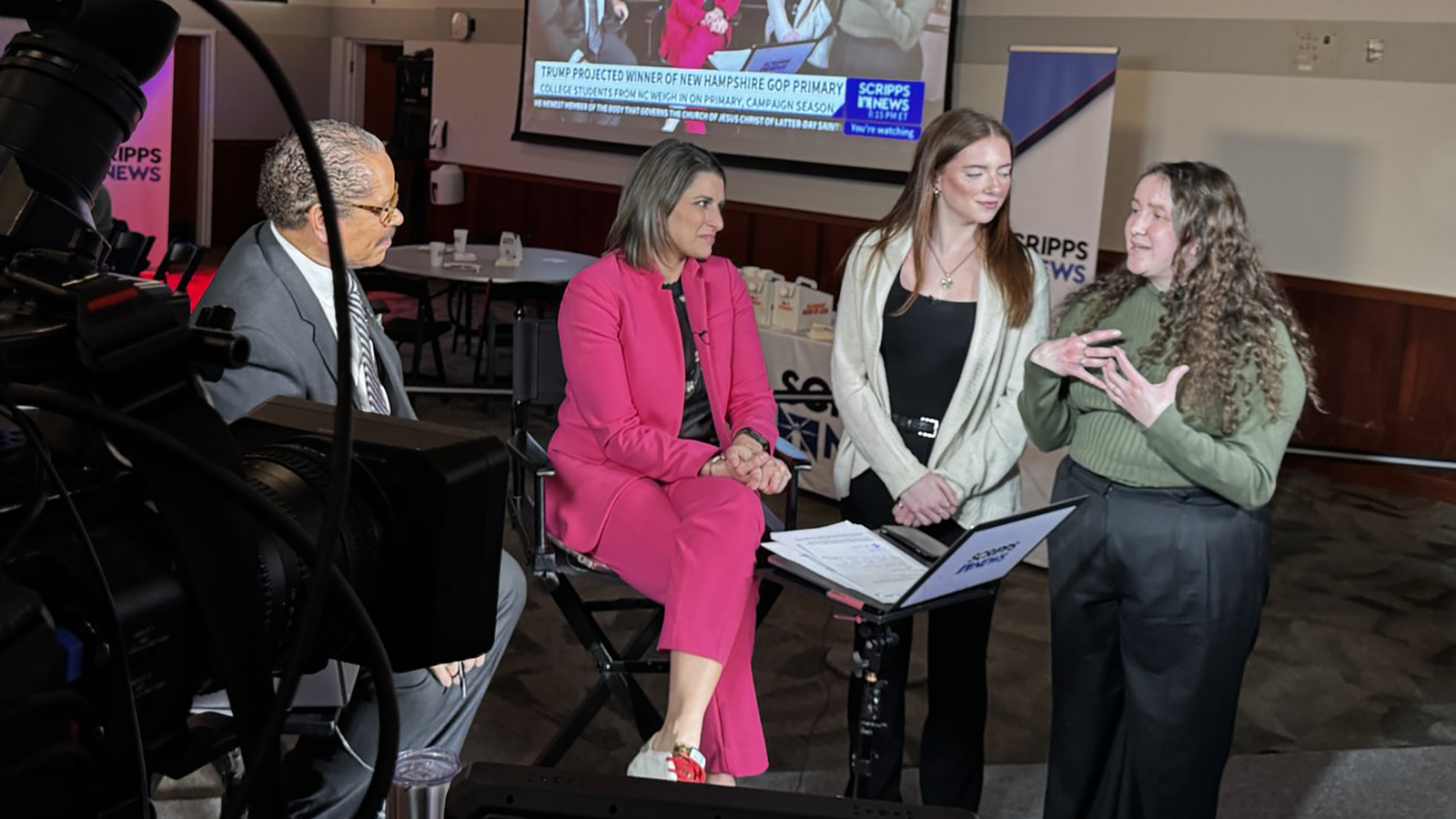
While Israel Balderas’ Winter Term class, The Presidential Campaign Starts Here, devoted ample attention to the candidates campaigning in South Carolina and New Hampshire, the assistant professor of journalism also emphasized the importance of amplifying the most important voices during this election cycle – the voices of potential voters.
It is why Elon students braved single-degree temperatures in Manchester, New Hampshire, to converse with Donald Trump supporters three hours before the former president’s scheduled address.
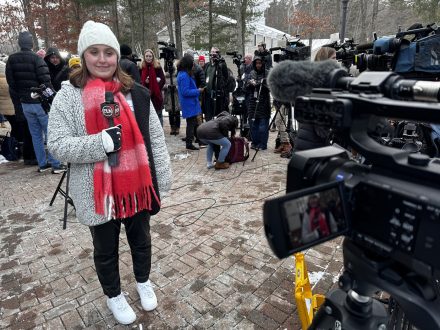
And why the students frequented Manchester’s famed Red Arrow Diner, a hot spot for presidential hopefuls, to speak with politically minded patrons and visitors.
And why during the course’s early days students canvassed Charleston, South Carolina, interviewing voters, from social workers to the homeless, about their political sentiments. This included volunteering at the Charleston County Democratic Party’s primary turnout phone bank.
To gain perspective on the 2024 presidential election, the 11 Elon students enrolled in the Study USA course, co-taught by Balderas and Political Science and Policy Studies Lecturer Jill Auditori, focused not just on the names on the ballots, but also on the individuals filling them out. For the better part of three weeks, the Elon contingent immersed themselves in the presidential primary process, navigating South Carolina and New Hampshire, and visiting small towns, crowded arenas, and notable landmarks – both formal and informal.
“The beauty of this course is we put our students in a position to engage with voters, join the crowds, follow candidates, and gain a true perspective on what is important to those casting the votes,” Balderas said. “Our goal was to give the students as much information as we could, and for them to learn about people, to learn about policy, and to learn about what politics means to people in South Carolina, in New Hampshire, and across our country.”
Becoming part of the story
As they engaged voters, community members and politicians along the campaign trail, the Elon students, a mix of journalism and political science majors, experienced a fascinating side effect.
They, too, became part of the story.
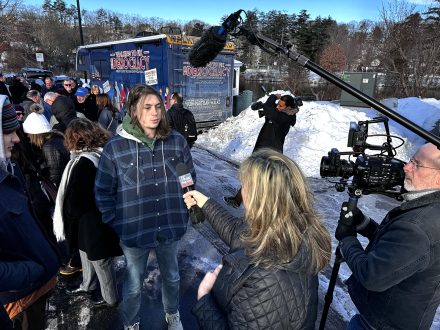
During the Winter Term course, students appeared in The Washington Post, were interviewed by NBC News, Fox News, C-SPAN, and several regional news organizations, and even spoke with four foreign news outlets. The students’ media exposure culminated with Emily Fenimore ’25 and Cailey Cetani ’24 appearing live with Scripps News as the Jan. 23 New Hampshire primary results rolled in.
“I think this piece of data sums up the experience best – our students appeared on 10 different media outlets during our three weeks on the road,” Balderas said. “Media members began telling our students’ story because, frankly, it is a good story to tell. Here we have Elon University sending students to learn about the presidential primaries, tracking all of the presidential candidates, and meeting with community members along the way. Everybody was amazed at what our students were doing.”
A political science major from Delaware, Fenimore grew up in a politically minded community, where conversations about policy and elections were commonplace. She was intentional in selecting the Study USA course because politics has always interested her. However, she did not anticipate appearing in front of the camera.
“The media attention was definitely something that I did not expect – at least not on the scale that we were exposed to,” she said, referencing her nearly five-minute-long Scripps News interview.
While she experienced some nerves on set, Fenimore said she was put at ease by Scripps News hosts Del Walters and Maritsa Georgiou, and recalled feeling empowered by the opportunity to share her points of view.
“I felt that my presence and opinions mattered,” she said. “So many voters are tuning in to watch the primary results and they got to hear from a young college student about what issues we feel need attention. This matters to the voters who do not understand or get to hear other perspectives.”
There was one person who wasn’t surprised by the media’s interest in the Elon course and its students. That was Balderas, the former television anchor and reporter. “There’s a reason why I brought a jacket and a tie on the trip,” he quipped. “You never know when you’re going to be on set. But coming into the course, I knew we were a story. I just didn’t know we would be this big of a story.”
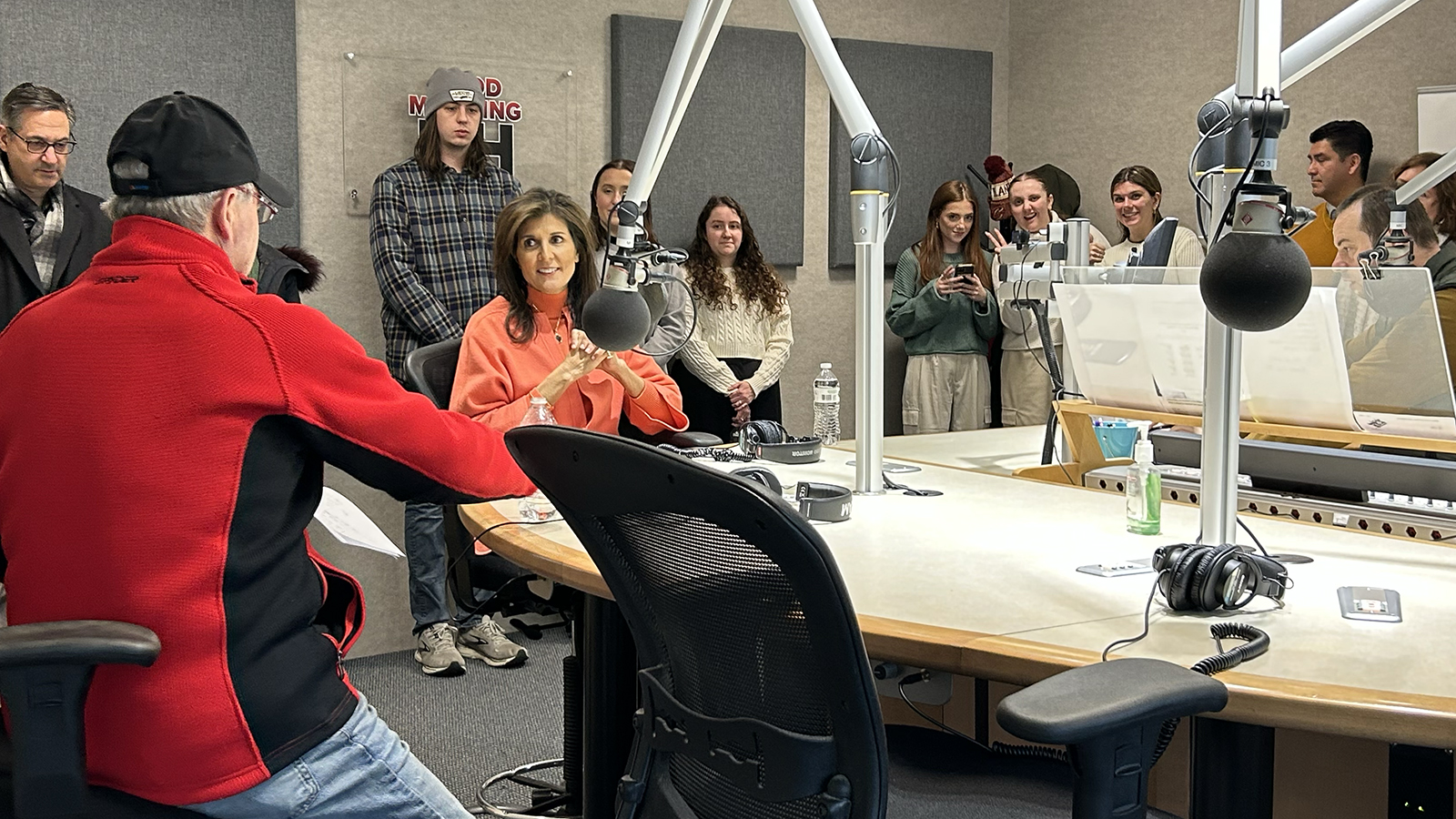
The power of networking and good timing
As Nikki Haley, Trump’s main competition for the Republican presidential ticket, settled in for a morning interview Jan. 23 with “Good Morning New Hampshire with Jack Heath,” Elon students stood arm’s length away from the former governor of South Carolina.
The moment was the result of diligent networking and fortuitous timing.
While in South Carolina in early January, the Elon class met with the authors of “We Are Charleston,” a book recounting the horrific 2015 shooting at Mother Emanuel African Methodist Episcopal Church. The authors recently developed a relationship with the university and they will offer the university’s Martin Luther King Jr. commemorative address on Feb. 26. And as luck would have it, coauthor Marjory Wentworth’s brother is Jack Heath, host of “Good Morning New Hampshire.” Thanks to Wentworth, a connection was made between the class and radio host.
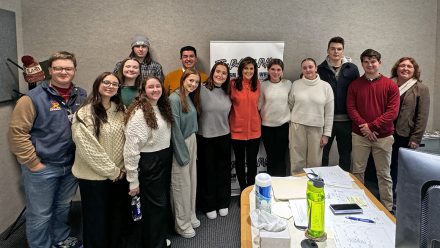
Heath graciously invited Balderas, Auditori and the students to attend a recording of his show leading up to the New Hampshire primaries. It was a great addition to the itinerary because the influential radio program regularly welcomes politicians, including the likes of Bill Clinton and Joe Biden. Given the fluid nature of the campaign trail, there was no scheduled guests when the invitation was extended.
On the morning of the scheduled visit, after battling heavy snow to attend, the Elon group learned that Haley was appearing on the radio show live – in person. She had flown in from Iowa the night before and was powering through on an hour of sleep.
Balderas recalled sensing a palpable buzz in the studio and among the students.
And Haley’s interview didn’t disappoint. While on the show, the former governor announced – for the first time – that she was no longer going to participate in debates unless Trump also attended.
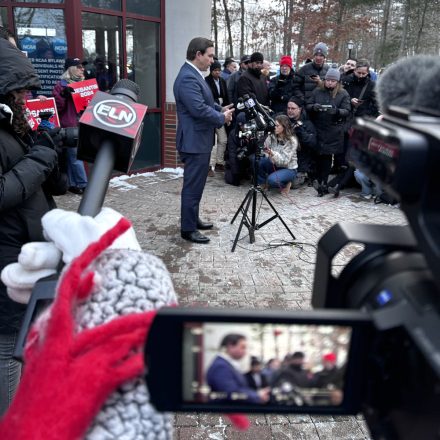
“That became a huge news story,” Balderas said. “And we happened to be right there when the news broke. How do you plan for something like that? You can’t. That’s the beauty of the presidential primaries class is that you can plan a course, you can have a syllabus, but you don’t know what you might encounter on the campaign trail.”
Cetani enjoyed the unparalleled access she and her classmates received, noting how different Haley was up close compared to her larger public appearances. “It wasn’t exactly as I expected it,” the senior recalled. “She took the time to shake our hands and talk to us, which was a surprise.”
Asked for her thoughts on Haley, Fenimore offered a more critical reflection, calling the candidate “especially fascinating for our group to study,” she said.
Having seen Haley speak three times, Fenimore noticed that the candidate’s speeches were rehearsed, word for word. And, on occasion, she contradicted her previous statements. One moment she called Trump “just as dangerous for our country as President Joe Biden,” Fenimore recalled, and then later the candidate acknowledged that she’d pardon Trump, if convicted.
“I never got to ask her about this because she avoided answering any questions from younger voters,” Fenimore said.
Providing depth and context
It is difficult to pinpoint the defining moment of The Presidential Campaign Starts Here course because so many come to mind.
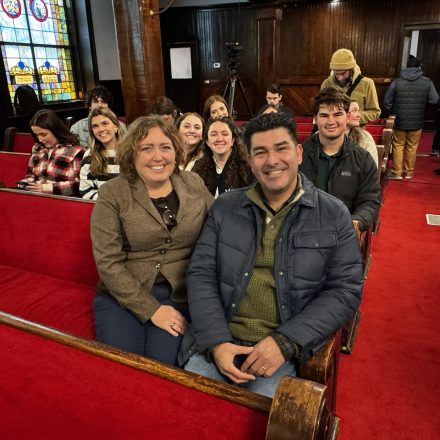
The students were in attendance as Biden visited the Mother Emanuel AME Church in Charleston, one of the oldest Black churches in the South.
The class ventured to tiny Dixville Notch, New Hampshire, for the community’s midnight election process, enduring bone-chilling temperatures among a throng of fellow media members. The event drew more media than people who actually vote, Balderas pointed out.
Plus, there were numerous other interactions, interviews and rallies with Biden’s challengers, Rep. Dean Phillips and Marianne Williamson, and Republican candidates Ron DeSantis, Trump and Haley. Plus, they visited the South Carolina headquarters for Robert F. Kennedy Jr., the former Democrat now running as an independent.
The course’s itinerary kept the students and faculty on the move all day – and sometimes most of the night. The Dixville Notch trip didn’t end until 4 a.m.
The students universally lauded their instructors for providing depth and context to each day and event. “Balderas’ past experience in journalism helped us a lot with opening doors and talking with people that we may have not had the chance to do otherwise,” Cetani said.
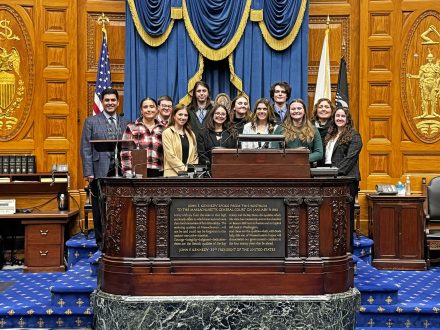
Fenimore credited Balderas for teaching her how to network, and to look at politics “through a journalism perspective,” she said. Likewise, Auditori encouraged students to seize opportunities and strengthen their political analysis skills.
“Their guidance helped me break out of (my) shell and find new experiences that I would have been too afraid to seek otherwise,” Fenimore said.
Balderas credited his co-instructor, Auditori, for balancing out the course, providing the necessary political expertise to supplement his journalism background. The students applauded the pairing for making the class worthwhile.
“This was not a journalism program or a political science program,” Balderas said. “It was truly an interdisciplinary program where we encouraged students to reflect critically and consider multiple perspectives. I love the interdisciplinary programs we offer here at Elon because of the impact we can make on our students.”
Abigail Hobbs ’25, a journalism major, recalled that the election-focused class played a role in her decision to attend Elon years ago. Similarly, several of the course participants cited an early interest in the course. And Hobbs said her experience lived up to her expectations.
“Reporting on the presidential elections is such an incredible experience as a student journalist,” said Hobbs, who is heavily involved in Elon News Network. “As a citizen, getting this amount of information and education on the upcoming election is a privilege. I feel incredibly grateful that we got to have this opportunity.”


